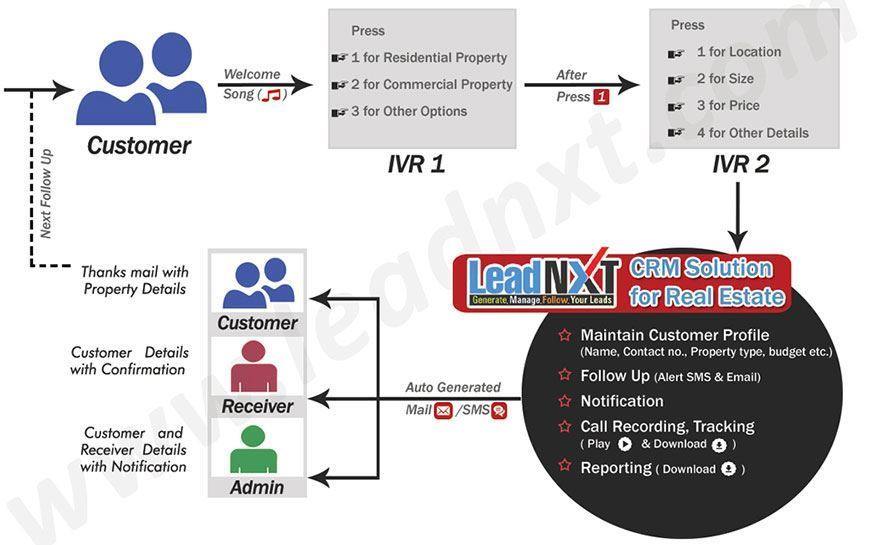Real Estate CRM
Real estate refers to properties consisting of land and the buildings on it, along with natural resources such as crops, minerals, or water.

Optimize Real Estate Operations with Advanced CRM Solutions
In the competitive world of real estate, managing leads, tracking client interactions, & automating workflows are essential for business growth. A real estate CRM provides an integrated platform to streamline sales, enhance client engagement, & optimize communication channels. From automated follow-ups to AI-powered analytics, a dedicated CRM solution transforms the way real estate professionals operate.
The Importance of a Real Estate CRM
A real estate CRM centralizes all client information, ensuring seamless data management & communication. Whether you are a property developer, broker, or real estate agency, an advanced CRM helps you:
Automate Lead Management: Capture, track, & nurture leads efficiently.
Enhance Customer Engagement: Personalize interactions to improve conversions.
Optimize Workflow Automation: Reduce manual tasks & increase productivity.
Improve Sales Tracking: Monitor pipeline progress with real-time insights.
Ensure Compliance & Security: Secure client data with cloud-based encryption.
Key Features of an Effective Real Estate CRM
1. Automated Lead Capture & Tracking
A real estate CRM automatically captures leads from multiple sources such as websites, social media, & online advertisements. With integrated call tracking & IVR systems, businesses can instantly engage with potential buyers & categorize leads based on interest level.
With automated responses & lead assignment, the CRM ensures no potential client is lost due to delayed follow-ups. The system helps prioritize leads based on behavior, ensuring sales teams focus on the most promising opportunities.
2. AI-Driven Lead Scoring & Prioritization
Using AI-powered algorithms, a CRM evaluates lead behavior & assigns scores based on engagement patterns. This ensures sales teams focus on high-potential clients, improving conversion rates.
Predictive analytics & behavior-based triggers help agents engage leads at the right time, increasing the chances of successful deal closures. This data-driven approach significantly enhances overall sales efficiency.
3. Multi-Channel Communication Integration
A comprehensive CRM integrates multiple communication channels, including calls, emails, SMS, & chatbots. This guarantees seamless interaction with clients, reducing response time & increasing satisfaction.
By maintaining a centralized communication history, agents can access past interactions & personalize their approach, improving customer satisfaction & fostering long-term relationships.
4. Task & Appointment Scheduling
Eliminate the hassle of manual scheduling with automated reminders & calendar synchronization. A CRM ensures no follow-up is missed, enhancing client relationships & business efficiency.
Automated alerts help agents stay on top of scheduled property viewings, meetings, & contract signings, minimizing missed opportunities. The system also allows clients to schedule appointments online, improving accessibility & convenience.
5. Real-Time Analytics & Performance Reports
Data-driven decision-making is crucial in real estate. A CRM provides real-time dashboards & analytics, offering insights into sales trends, campaign performance, & customer preferences.
Detailed performance reports allow businesses to track agent productivity, identify bottlenecks, & optimize sales strategies. By leveraging key data insights, companies can refine marketing efforts & enhance lead acquisition tactics.
6. Seamless CRM & Marketing Automation
An advanced CRM integrates marketing automation tools to streamline email campaigns, SMS outreach, & digital advertisements. This enhances brand visibility & increases lead engagement.
Automated drip campaigns help nurture leads over time, keeping potential buyers informed about new listings, price drops, & market trends. This ensures prospects remain engaged until they are ready to make a purchase decision.
7. Customizable Workflows & Integrations
Every real estate business operates differently, & a CRM should be flexible enough to accommodate unique workflows. With customizable automation rules, businesses can streamline repetitive tasks & ensure a more efficient sales process.
Additionally, seamless integrations with third-party platforms such as MLS databases, property listing websites, & accounting tools ensure a fully connected real estate ecosystem.
Benefits of Implementing a Real Estate CRM
Increased Lead Conversion Rates
By automating lead management & nurturing processes, businesses experience higher conversion rates & improved revenue generation.
With instant lead response mechanisms & AI-driven engagement strategies, businesses can capitalize on high-intent buyers, shortening the sales cycle & maximizing revenue potential.
Enhanced Customer Relationship Management
A CRM enables personalized communication, ensuring better client relationships & long-term loyalty.
Maintaining comprehensive client profiles allows agents to understand buyer preferences, making it easier to match them with suitable properties. Personalized engagement increases client retention & referral business.
Scalability & Customization
Modern real estate CRMs offer customizable features to meet unique business needs. Whether handling residential, commercial, or rental properties, the system adapts seamlessly.
As businesses grow, a scalable CRM ensures that expanding teams can manage increasing client volumes without compromising service quality.
Improved Team Collaboration
With cloud-based accessibility, team members can collaborate efficiently, reducing miscommunication & enhancing productivity.
Shared access to client data, deal progress, & task assignments fosters a collaborative work environment, ensuring seamless operations across different departments.
Compliance & Data Security
A CRM ensures adherence to industry regulations while securing sensitive client information through encrypted storage & controlled access.
With built-in security measures, businesses can mitigate risks related to data breaches, ensuring compliance with legal requirements & client confidentiality standards.
Choosing the Right Real Estate CRM
Selecting the right CRM depends on business requirements, scalability, & integration capabilities. A robust real estate CRM should offer:
User-friendly interface & mobile accessibility.
Seamless integration with third-party tools & marketing platforms.
AI-driven automation for enhanced decision-making.
Cloud-based storage for easy access & security.
Advanced analytics & reporting functionalities.
Conclusion
A real estate CRM is an essential tool for modern real estate professionals, offering streamlined lead management, automated workflows, & enhanced client engagement. Investing in the right CRM solution drives business growth, increases operational efficiency, & ensures long-term success in the competitive real estate market.
By leveraging advanced automation, AI-driven analytics, & multi-channel communication, businesses can optimize every aspect of real estate sales & management, setting themselves apart in an ever-evolving industry.
